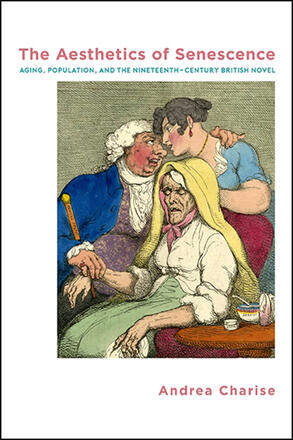
The Aesthetics of Senescence
Aging, Population, and the Nineteenth-Century British Novel
Alternative formats available from:
Investigates how nineteenth-century British literature grappled with a new understanding of aging as both an individual and collective experience.
Description
Shortlisted for the 2020 BSLS Book Prize presented by the British Society for Literature and Science
The Aesthetics of Senescence investigates how chronological age has come to possess far-reaching ideological, ethical, and aesthetic implications, both in the past and present. Andrea Charise argues that authors of the nineteenth century used the imaginative resources of literature to engage with an unprecedented climate of crisis associated with growing old. Marshalling a great variety of canonical authors including William Godwin, Mary Shelley, George Eliot, Anthony Trollope, and George Gissing, as well as less familiar writings by George Henry Lewes, Christoph Wilhelm Hufeland, Agnes Strickland, and Max Nordau, Charise demonstrates why the imaginative capacity of writing became an interdisciplinary crucible for testing what it meant to grow old at a time of profound cultural upheaval. Charise's grounding in medicine, political history, literature, and genre offers a fresh, original, thoroughly interdisciplinary analysis of nineteenth-century aging and age theory, as well as new insights into the rise of the novel—a genre usually thought of as affiliated almost entirely with the young or middle-aged.
At the University of Toronto Scarborough, Andrea Charise is Assistant Professor in both the Department of English and in the Interdisciplinary Centre for Health & Society.
Reviews
"Andrea Charise makes a substantial contribution to nineteenth-century studies and the field of aging studies." — University of Toronto Quarterly
"In the context of Covid-19, these questions of aging, population, and demographic thinking have come into yet sharper focus and this book is a brilliant example of what the past might have to tell us about growing older together." — Studies in Romanticism
"The Aesthetics of Senescence is a valuable, and highly original, contribution to the emergent field of aging studies in nineteenth-century literature, which enables readers to see more clearly embodied aging as a social, cultural, and national phenomenon. It shows how old anxieties of aging intensify and new ones emerge in the nineteenth century in relation to what Charise calls the biopolitics of aging, which draws on medical, scientific, economic, and ethical contexts. It is a book that will be integral to future discussions of aging in the period." — Modern Philology
"As we assess the cultural status of age and aging in our own time, Charise provocatively shows how fiction can highlight the continued importance of collective identity and the value of intersubjectivity. She thus illuminates the history of gerontology as well as nineteenth-century British fiction." — Review 19
"…a genius-level contribution to aging studies that, best thing of all, starts with poetry!" — Poetry Magazine
"Charise's brilliantly argued, clearly written book is an important intervention in nineteenth-century British literature, age studies, and medical humanities. It brings these areas of inquiry together in what seems a seamless way—as if they have always traveled together or ought to have. Through an investigation of what she calls the 'aesthetics of embodiment that shaped nineteenth-century visions of aging,' Charise has given us an original and groundbreaking study of literary, historical, anthropological, and philosophical texts." — Devoney Looser, author of The Making of Jane Austen